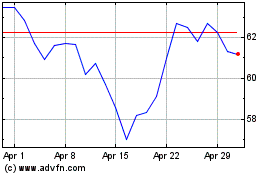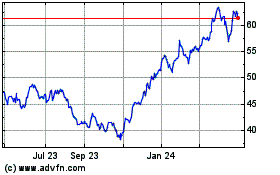Banks Take First Steps on Climate Risk Evaluations
June 14 2019 - 3:29PM
Dow Jones News
By Kristin Broughton
Chief risk officers of financial institutions are taking initial
steps to evaluate the threat of climate change, but weighing the
dangers posed by a warming planet isn't yet a standard industry
practice.
Twenty-six percent of banks and financial firms say they have
established dedicated teams in their corporate risk or
sustainability offices for evaluating climate-related risks,
according to a survey by the Global Association of Risk
Professionals. The survey included 27 banks and asset management
firms with about $20 trillion in collective assets.
The finding comes as banks face increased scrutiny from
investors and regulators over how extreme weather or environmental
regulations could affect their bottom lines.
The Financial Stability Board, an international group of
financial regulators, in December 2015 established a task force to
create voluntary guidelines for disclosing environmental risks. An
increasing number of financial firms have adopted those
guidelines.
Last year, 48% of banks published information about board-level
oversight of sustainability issues -- one of the recommended areas
of disclosure -- compared with 34% three years ago, according to a
report published this month by the FSB's Task Force on
Climate-Related Financial Disclosures.
For many companies, environmental issues -- once the territory
of corporate sustainability offices -- could soon start fall under
the purview of corporate risk managers as they become a bigger
priority, according to Jo Paisley, co-president of GARP's research
institute.
"I don't think you want it corporate-responsibility led," Ms.
Paisley said. Instead, it should be integrated into standard risk
management controls, since corporate risk divisions are responsible
for protecting the company's core business units, she said.
Banks should consider creating working groups with executives
across several divisions to assess the impact of climate change on
their core businesses, Ms. Paisley said.
Citigroup Inc. this year established a working group to
integrate climate issues into its risk management controls. The
group was created by the direction of the bank's chief risk
officer, Bradford Hu, in response to the TCFD's recommendations, as
well as an increasing number of regulatory inquiries on
climate-related matters, executives said.
"This has really grown in importance and focus at the top of the
house," said Eliza Eubank, Citi's global head of environmental and
social risk management.
The New York bank in November published its first climate report
under the TCFD guidelines. It has also worked with several other
big banks to develop pilot models to assess how various
planet-warming scenarios could affect the underlying performance of
loan portfolios.
The efforts have helped the bank understand how it could be
affected if its borrowers are negatively affected by climate
change, executives said. The modeling project, in particular, has
also provided a starting point for future discussions with
borrowers about the climate-risk controls they have in place,
according to the company.
"It's just a baby step into a big new world of climate risk,"
Ms. Eubank said.
Write to Kristin Broughton at Kristin.Broughton@wsj.com
(END) Dow Jones Newswires
June 14, 2019 15:14 ET (19:14 GMT)
Copyright (c) 2019 Dow Jones & Company, Inc.
Citigroup (NYSE:C)
Historical Stock Chart
From Mar 2024 to Apr 2024

Citigroup (NYSE:C)
Historical Stock Chart
From Apr 2023 to Apr 2024
